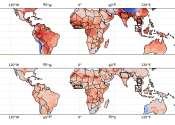Ice age climate analysis reduces worst-case warming expected from rising CO₂
As carbon dioxide accumulates in the atmosphere, the Earth will get hotter. But exactly how much warming will result from a certain increase in CO2 is under study. The relationship between CO2 and warming, known as climate ...









